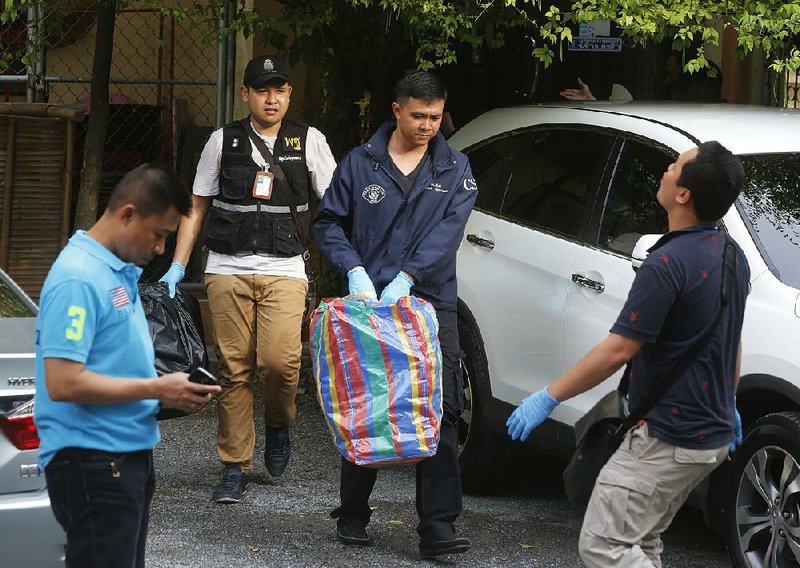BANGKOK -- Thai police arrested a foreign man over a deadly explosion in central Bangkok almost two weeks ago, after discovering bomb-making materials during a search of an apartment in the capital Saturday.
All television channels broadcast an announcement Saturday evening on the suspect's arrest, which came 12 days after the bombing that authorities have called the deadliest attack in Thailand's modern history.
The 28-year-old man is being detained by the military and will be charged with possessing explosives, police spokesman Prawut Thawornsiri said in a briefing Saturday, without explaining how the suspect might be linked to the Aug. 17 attack.
The blast during evening rush hour in the Ratchaprasong shopping district killed 20 people, including tourists from China and Malaysia, and injured 120.
Prawut showed photographs of the suspect -- a man with short brown hair and a light beard. Police did not release his name.
Photographs also were shown of what police seized, including detonators, ball bearings and a metal pipe that police believe was intended to hold a bomb.
Police also found "a number of passports from one country," Prawut said. He did not name the country.
Earlier, Prawut said authorities had not yet determined the suspect's nationality and dismissed Thai news reports saying he is Turkish. Images of a Turkish passport with the apparent suspect's picture were posted on social media.
"The passport you see is fake," said Prawut, referring to the online photos. "We don't know if he is Turkish or not."
A Turkish government spokesman said he had no information on the suspect or any possible Turkish link to the attack. He spoke on condition of anonymity in line with Turkish government rules that bar officials from speaking to journalists without authorization.
Police and soldiers raided the apartment in a nondescript concrete building on the outskirts of eastern Bangkok.
Police are still searching for a suspect in a second explosion a day later at a popular Bangkok boat pier. That explosion did not cause injuries.
"After a preliminary investigation, we believe this man is linked to the bombs at both Ratchaprasong and Sathorn," Prawut said. "We believe he is a member of the group."
On Thursday, police officials said the bomb probably wasn't the work of international terrorists, although an arrest warrant issued earlier for the unnamed key suspect described him as a foreigner. Local media reports have been critical of the police for giving conflicting details on the nationality of suspects and the haste with which the shrine was reopened.
No one has claimed responsibility for the blast, sparking a variety of theories of who might be behind it. Possible suspects include parties seeking to avenge Thailand's forced repatriation of ethnic Uighurs to China. Uighurs are related to Turks, and Turkey is home to a large Uighur community.
Other theories included Muslim separatists from southern Thailand, opponents of Thailand's military government and feuding factions within the security services.
Thailand has tightened security at border crossings and in locations popular with tourists, Winthai Suvaree, a spokesman for the ruling junta, said Saturday. Tourism accounts for more than 10 percent of Thailand's economy.
Police have been criticized for releasing conflicting statements and rapidly hosing down the crime scene at the shrine before all forensic evidence was recovered. Many accused authorities of rushing to clean up the bomb scene to reassure the public -- especially foreign tourists -- that security in the city was back to normal.
Police say they have been handicapped by low-quality and broken surveillance cameras and a lack of sophisticated image-processing equipment to clarify the fuzzy images in security videos, which were the only firm evidence they had.
In addition to the prospect that Thailand was targeted by international terrorists, the attack also raised the specter of renewed violence in a country that has seen years of political unrest, culminating in military coups in 2006 and May 2014.
The Ratchaprasong intersection was the site of protests in 2010 by supporters of former Prime Minister Thaksin Shinawatra, which led to a deadly military crackdown, and was where a major shopping mall was set ablaze. It was also among the places attacked in a series of bombings on New Year's Eve in 2006 that killed three people and wounded dozens.
Information for this article was contributed by Suttinee Yuvejwattana of Bloomberg News and by Nattasuda Anusondisai, Jocelyn Gecker, Papitchaya Boonngok and Suzan Fraser of The Associated Press.
A Section on 08/30/2015
